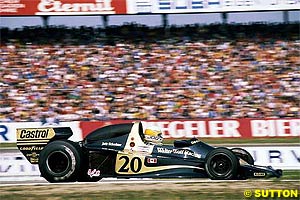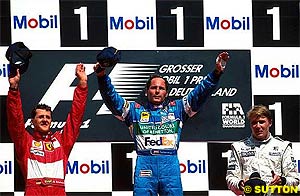
Atlas F1 Magazine Writer
As Michael Schumacher aims to equal the record for most wins in a single season in next Sunday's race, his Ferrari team could clinch their sixth consecutive constructors' title. Atlas F1's Marcel Schot brings the statistics and anecdotes from the German Grand Prix
However, not all that's shining is Schumacher. Silverstone also saw a return to form from McLaren and more specifically from Kimi Raikkonen. The young Finn scored McLaren's first pole position since Indianapolis last year as well as the first podium finish of the year.
Behind Schumacher his teammate Rubens Barrichello is a much criticised man. The Brazilian would lack a winners' mentality and is rued for playing second fiddle to his German teammate. However, the results are there. In fact, Barrichello is playing the part of the ideal second driver. With no less than seven straight podium finishes and points in his last twelve races, the number two Ferrari driver does exactly what is asked for him: bring in the points.
While Schumacher can concentrate on wins and the drivers' title, Barrichello makes sure to steal away valuable points from the competition. This, on one side, makes Schumacher's work easier and, on the other, makes it sure that Ferrari will win their sixth consecutive Constructors' Championship. While their current five is already a record for constructors, it is not yet for engines. That record still lies with Ford, which won the championship with Lotus, Matra, Tyrrell and McLaren for seven years straight between 1968 and 1974. That, however, is for next year. This year Ferrari aim to equal Honda (1986-1991 with Williams and McLaren) and Renault (1992-1997 with Williams and Benetton) for six consecutive titles.
Obviously 2004 is a mere formality for the Maranello team. With seven races to go Renault can reach a maximum of 205 points, which means Ferrari will need just 32 points if Renault finish every single race a one-two from now on. However, a one-two for Ferrari at Hockenheim will give them 192 points, which would mean the title in case Renault would score less than six points.
Two of a Kind
The German Grand Prix has been the event where two teams achieved their only pole position. In 1977 it was Jody Scheckter who gave Wolf their only pole, while eight years later Teo Fabi achieved the same for Toleman.
For Jody Scheckter the 1977 season started out unexpectedly well. The South African scored victories in Argentina and Monaco and was doing well in the championship, despite four consecutive races with no points prior to the German Grand Prix. Niki Lauda was leading with 39 points, with Scheckter and Mario Andretti tied for second at 32 points each. The move to Wolf, entering its first year, from the successful Tyrrell team, was a gamble, but so far it was working out. However, it was more down to race pace than qualifying speed. He had won from eleventh in Argentina and Monaco had been the only time when Scheckter started from the front row.
The opening qualifying session didn't bring much hope for a change either. Scheckter was hopelessly off the pace and finished with the seventh quickest time, nearly a second and a half behind James Hunt in the McLaren. The second session in the afternoon had the drivers dealing with worse track conditions. Scheckter didn't improve his time from the morning session, but a fifth place gave some hope.
In the race Scheckter initially was able to hold on to the lead. However, when Watson retired after seven laps, the Wolf driver had Niki Lauda chasing after him and after 13 laps the Austrian managed to get past and disappeared into the distance. Unable to follow, Scheckter settled for second and concentrated on keeping his position, successfully fending off the attacks from James Hunt. While Hunt and later Andretti retired, Scheckter kept going and finished second ahead of Hans-Joachim Stuck in the second Brabham.
In 1985, the German Grand Prix was held at the new Nurburgring. Looking ahead, this appeared to be just another race in a disastrous season for the Toleman team. After having lost the talent of Ayrton Senna to Lotus after 1984, the team started as a one driver operation with Italian Teo Fabi behind the wheel. They missed the first three races of the season and when they appeared in Monaco it was disaster upon disaster. Qualifying positions were usually on the lower half of the grid and the car never lasted a race distance. However, the race before the German Grand Prix, at Silverstone, showed some progress. Fabi managed to qualify ninth and in fact managed to hold on to that position for the few laps he lasted in the race.
After the first free practice session at the Nurburgring the surprise was complete. The timesheets showed Fabi in the Toleman at the top, ahead of Lauda and Senna. Obviously this must have been some kind of fluke and it couldn't last. At least that was what the competition was expecting. They were wrong. In the afternoon's qualifying session it was again Fabi on top, this time no less than 1.1 seconds ahead of Stefan Johansson's Ferrari.
Of course there was still the second qualifying session on Saturday to be held and morning practice showed Fabi in a more familiar 21st position. However, all went well for Fabi in the end when rain spoiled the qualifying session and Friday's results remained unaffected. This meant that Fabi gave Toleman their only pole position, something even qualifying legend Ayrton Senna hadn't managed.
In true Toleman 1985 fashion, things went wrong rapidly in Sunday's race. Fabi messed up his start, dropping to eight place. For the next 29 laps the Toleman driver struggled, finally giving up with a broken clutch. The rest of the season continued without a single highlight and only a sole race finish in Monza. At the end of the season the Benetton family bought the team and that was the end of the Toleman name in Formula One.
This Week in History
It's seven years ago this week that the Benetton team scored its last win. In a season dominated by Ferrari and Williams, with McLaren and Benetton usually battling it out for the remaining points.
For Gerhard Berger the weekend of the German Grand Prix was a memorable one. On Thursday, the Austrian announced that he would not be returning to the wheel of the Benetton in 1998, shortly before taking the wheel again after an absence of three weeks due to sinus problems.
First practice was worse than usual for the Benetton team as Gerhard Berger finished 14th just ahead of his teammate Jean Alesi. However, most of the day's practice was run on a wet track, rendering the times rather pointless. Saturday practice was run in the dry and showed a much more positive view for Benetton. While the Jordans were surprisingly quick in first and fourth, it was the Benettons and McLarens up there with them rather than the usual Williams and Ferraris. Jean Alesi posted the third quickest time, while Gerhard Berger wasn't far behind him in fifth.
Once the race got underway it rapidly became clear that the qualifying result hadn't been a fluke. Berger moved away from the field at a considerable pace as Fisichella's Jordan didn't quite have the same pace in the race as in qualifying. This was bad news for the other drivers as the Italian was neither fast enough to follow Berger not slow enough to be passed by those who followed him. This mainly frustrated Michael Schumacher, who saw the gap to Berger increase at over a second per lap while his Ferrari was clearly faster than it was possible to go with Fisichella in the way.
After 17 laps Berger made an early pitstop. After having led by 13 seconds, the Austrian returned to the track in fourth place behind Fisichella, Schumacher and Mika Hakkinen. Hakkinen was next to pit, while Schumacher started losing ground to Fisichella and pitted a few laps later. Fisichella finally pitted seven laps after Berger, handing the lead back to the Benetton driver. From there on the veteran was the only driver able to maintain the speed of the first part of the race, allowing him to keep the lead after his second pitstop.
When Giancarlo Fisichella retired with five laps to go and Michael Schumacher got warped back because of his second stop, Berger was able to bring the car home at ease and score Benetton's only win in the post-Schumacher era. It eventually happened to be Benetton's last win under that name, making Berger both the first and last winner of the Benetton team.
With yet another win for Michael Schumacher things should be getting a bit boring even for him. However, the German is as joyful as ever when he climbs onto the podium and, strictly taken, there's always another record to achieve. At the German Grand Prix the six times World Champion can tie his own record of 11 wins in a season from 2002, for example.
 The final qualifying session on Saturday afternoon showed vastly improved conditions in which the times dropped nearly two seconds from Friday. This appeared in Scheckter's advantage and after having been out of the spotlight, the Wolf driver claimed a surprising pole position. John Watson in the Brabham was second, three tenths behind, while championship leader Niki Lauda put his Ferrari third. Scheckter's other rival in the championship, Mario Andretti, didn't get further than sixth place, a second slower than the polesitter.
The final qualifying session on Saturday afternoon showed vastly improved conditions in which the times dropped nearly two seconds from Friday. This appeared in Scheckter's advantage and after having been out of the spotlight, the Wolf driver claimed a surprising pole position. John Watson in the Brabham was second, three tenths behind, while championship leader Niki Lauda put his Ferrari third. Scheckter's other rival in the championship, Mario Andretti, didn't get further than sixth place, a second slower than the polesitter.
 In qualifying things went even better. While Mika Hakkinen set the pace early on, Berger made a great comeback after his three-race break by setting pole position ahead of Jordan driver Giancarlo Fisichella. Both Ferrari and Williams disappointed. Especially Jacques Villeneuve, who qualified ninth and Eddie Irvine in tenth performed well below par.
In qualifying things went even better. While Mika Hakkinen set the pace early on, Berger made a great comeback after his three-race break by setting pole position ahead of Jordan driver Giancarlo Fisichella. Both Ferrari and Williams disappointed. Especially Jacques Villeneuve, who qualified ninth and Eddie Irvine in tenth performed well below par.
|
Contact the Author Contact the Editor |
Please Contact Us for permission to republish this or any other material from Atlas F1.
|
Volume 10, Issue 29
Articles
Forte e Gentile: Analysing Trulli
Every Other Sunday
2004 German GP Preview
2004 German GP Preview
German GP Facts & Stats
Columns
The F1 Trivia Quiz
Bookworm Critique
On the Road
Elsewhere in Racing
The Weekly Grapevine
> Homepage |